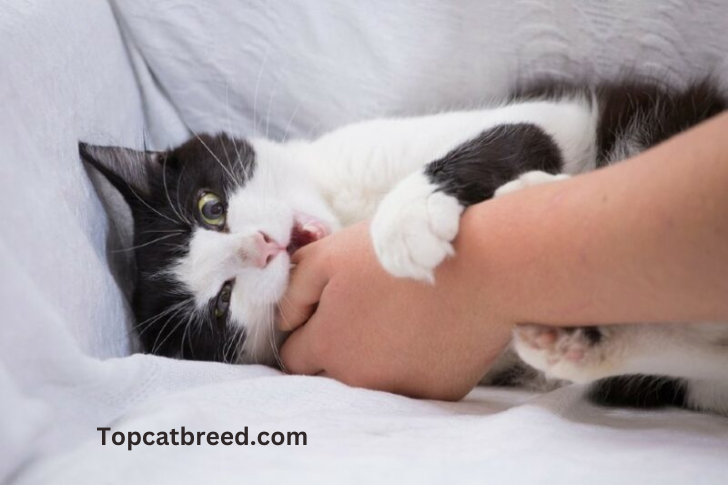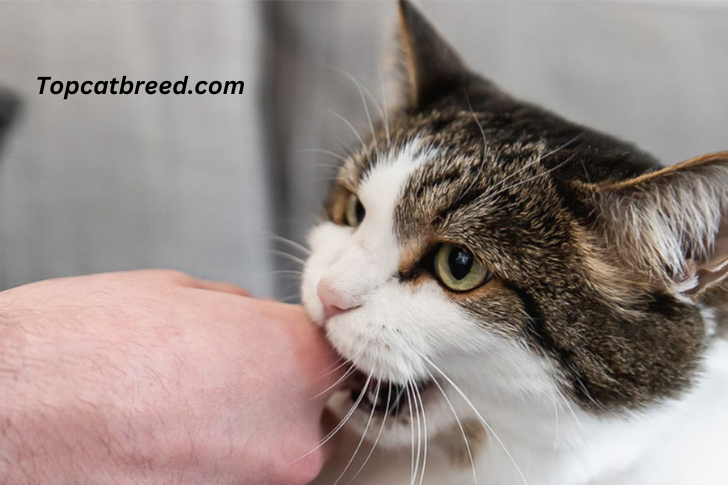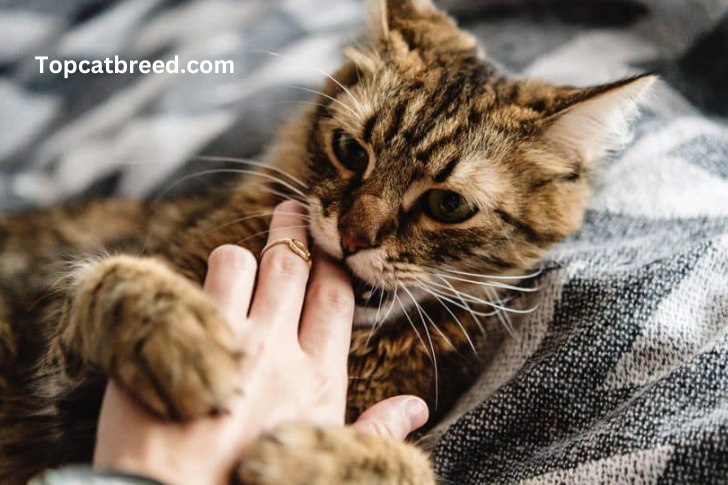“Ever wondered, ‘why does my cat bite me?’ Our feline friends, known for their charming antics, may surprise us with a gentle nibble or an unexpected bite. Understanding these behaviors is key to a harmonious relationship. Discovering the reasons behind your cat’s bites can be enlightening. Firstly, cats might bite out of playfulness, exploring their world with curiosity. Secondly, stress or fear can trigger defensive bites.
Thirdly, overstimulation during play or petting may lead to bites. Additionally, misdirected hunting instincts can result in playful biting. Lastly, your cat may bite and lick as a sign of overexcitement. Recognizing these cues can help prevent painful encounters and enhance your bond. So, if the question ‘Why does my cat bite me?’ echoes in your mind, delve into this article to uncover the five insightful reasons shaping this common feline behavior, ensuring a paw-fictively enriching relationship with your beloved companion.”
Reasons your cat may bite you
1. Playful Exploration:
Embark on understanding your cat’s playful bites, the cornerstone of Playful Exploration. As natural hunters, cats use gentle nibbles to navigate and interact with their surroundings. This instinctual behavior mirrors their curiosity and desire for interactive play. To enhance these moments, introduce toys that cater to their innate hunting tactics safely.
Engage with fishing rod toys or feather wands to redirect their energy positively. This not only refines their hunting skills but also forges a stronger bond between you and your feline companion, fostering a playful and enriching relationship.
2. Stress and Fear:
Dive into the second reason, Stress and Fear, to unravel the complexities behind your cat’s biting behavior. When confronted with stress or fear, cats resort to defensive biting as a means of self-protection. Recognizing subtle stress signals, such as hissing or flattened ears, becomes crucial. Establish a tranquil environment with secluded spaces to alleviate stressors.
By addressing potential causes, whether environmental changes or health concerns, you create a serene haven for your cat, diminishing the likelihood of defensive bites and ensuring a calm and contented companion.
3. Overstimulation during Play:
Explore the third reason, Overstimulation during Play, as a pivotal factor in understanding your cat’s biting tendencies. Much like humans, cats have thresholds for play intensity. Recognize early signs of overstimulation, such as a twitching tail, and tailor your interactions accordingly. Implementing short, focused play sessions with suitable toys channels their energy positively.
By respecting their play boundaries and creating a harmonious play environment, you minimize the chances of overstimulation-related bites, fostering a positive and enjoyable play experience.
4. Misdirected Hunting Instincts:
Unlock the mystery behind why your cat may bite like prey—the fourth reason, Misdirected Hunting Instincts. Especially prevalent in kittens, this behavior often stems from early play habits. Redirect their energy by introducing stimulating toys that satisfy their natural hunting instincts without posing harm.
Transforming biting sessions into engaging play not only enhances their physical well-being but also cultivates a positive association with interactive toys. By shifting the focus from hands to toys, you provide a safe and enjoyable outlet for their hunting instincts, fostering a balanced and fulfilling relationship.
5. Overexcitement and Affection:
Delve into the dual nature of bites and licks with the fifth reason, Overexcitement and Affection. Your cat may express both excitement and affection simultaneously, showcasing their enthusiasm during bonding moments. Channel this energy positively by incorporating structured play sessions and enticing toys into your routine.
Recognizing these signals allows you to respond appropriately, strengthening the loving connection with your furry friend. Embrace the duality of biting and licking as a testament to their affectionate nature, reinforcing positive dynamics in your relationship and ensuring a joyful companionship.
What do I do if my cat bites me?

Dealing with a cat bite requires a calm and measured approach. Follow these steps to ensure a safe and effective response:
Stay as Still and Calm as Possible:
- Sudden movements and loud noises may escalate the situation.
- Avoid startling the cat, as it could lead to additional stress or fear.
Safely Remove Yourself from the Situation:
- Give your cat space and time to calm down.
- Allow them to run away and hide if needed, providing an opportunity for both of you to cool off.
- Clean the Wound: If the cat’s teeth have punctured your skin, clean the wound with soap and warm water.
- Gently pat it dry and cover it with a clean dressing to prevent infection.
Understand the Reason for the Biting:
- Reflect on the circumstances leading to the bite.
- Was the cat stressed, over stimulated, or reacting to a specific situation?
Speak to Your Vet or a Qualified Cat Behaviorist:
- If biting is unusual behavior, consult with your vet to rule out any health issues.
- A qualified cat behaviorist can provide tailored advice to address behavioral concerns.
Implement Preventive Measures:
- Identify triggers and avoid situations that may lead to biting.
- Create a calming environment for your cat to reduce stressors.
Monitor for Signs of Infection:
- Keep a close eye on the bite wound for any signs of infection.
- If redness, swelling, or pain persists, seek medical assistance promptly.
Remember, a measured and understanding response helps create a safer environment for both you and your feline friend.
Also Read this .Cat growling in sleep? All possible reasons
How do I stop my cat from biting me?

Cats may bite for various reasons, but curbing this behavior is possible with patience and the right approach. Here are practical steps to prevent your cat from biting:
1. Set Clear Boundaries:
Establishing clear boundaries is essential. Communicate that biting is unacceptable through consistent rules. Cats thrive on routine, and understanding what is expected helps shape their behavior. When your cat respects these boundaries, reward them with positive reinforcement like treats or affection.
- Cats benefit from consistent rules. Set clear boundaries regarding acceptable behavior, emphasizing that biting is not appropriate.
2-Avoid Playing with Bare Hands:
- Teach your cat that hands are not toys by avoiding playful interactions with bare hands.
- Provide engaging toys as an alternative outlet for their play instincts.
3. Introduce Interactive Toys:
Channel your cat’s energy into interactive toys. Toys like feather wands or puzzle feeders offer a constructive way for them to express their playful nature without resorting to biting. Engage in play sessions with these toys, making it a positive and enjoyable experience for your cat.
4. Positive Reinforcement:
- Reinforce positive behavior with praise and rewards.
- Encourage gentler interactions and acknowledge appropriate play.
Consider using clicker training paired with treats to reinforce desired behavior consistently.
5. Use Distraction Techniques:
- Employ distraction techniques like a sudden noise or offering a toy when you sense biting tendencies.
- Redirect their attention away from biting to more acceptable behaviors.
Consistency is key in reinforcing this behavior. Practice these distraction techniques during play and observe how your cat responds positively to alternative activities.
Also read .Why does my cat yowling after eating? 6 reasons
How Can I Tell If My Cat Is About To Bite Me?
Understanding your cat’s body language is crucial in anticipating and preventing bites. Keep an eye out for these signs:
Tail Flicking and Lashing: If your cat’s tail is flicking rapidly or lashing back and forth, it may indicate irritation or discomfort. Take this as a warning sign that a bite might be imminent.
Ears Pinned Back: Pinned-back ears signal unease or annoyance. When a cat feels threatened or irritated, their ears may flatten against their head, signaling potential aggression
Hissing or Growling: Vocalizations like hissing or growling are clear indicators of your cat’s emotional state. If these sounds accompany other warning signs, exercise caution to avoid a potential bite.
Dilated Pupils: Enlarged pupils can signal heightened arousal or stress. If your cat’s eyes appear dilated, it’s a sign that they may be reaching their tolerance limit.
Body Tension: Pay attention to your cat’s overall body tension. Stiffening or rigidity, especially when combined with other warning signs, may indicate a potential bite.
How to Handle a Cat Bite
If, despite your best efforts, a cat bite occurs, follow these steps for proper handling:
Stay Calm and Still: Sudden movements can escalate the situation. Stay calm and avoid startling the cat further. Speak in soothing tones to reassure both yourself and the cat.
Gently Remove Yourself: Safely withdraw from the situation. Give the cat space to calm down and reduce the risk of further aggression. Allow them an opportunity to retreat.
Clean the Wound: If the cat has broken the skin, clean the wound with soap and warm water. Pat it dry gently and cover it with a clean dressing. Monitor for any signs of infection.
Seek Medical Attention: Cat bites can lead to infections. If the wound shows signs of infection or doesn’t heal, seek medical attention promptly. Tetanus boosters may be necessary.
Reflect on the Incident: Consider what triggered the bite. Reflecting on the incident can help you understand your cat’s stressors and prevent future occurrences. Consult with a vet or behaviorist for guidance.
By recognizing warning signs and handling cat bites with care, you can foster a safer and more harmonious relationship with your feline companion.
FAQS
1. Why is my cat biting me?
Cats may bite for various reasons, such as fear, stress, overstimulation, or to communicate a need. Understanding their behavior and addressing the underlying cause can help prevent biting.
2. Why do cats love bite?
Love biting is often a sign of overstimulation. Cats may engage in gentle biting as a way to express affection, but it’s essential to recognize their body language and set boundaries to avoid potential discomfort.
3. What are the real reason cats bite you?
The reasons cats bite can vary. It may be to assert dominance, respond to a threat, stop unwanted actions, or communicate a demand for attention. Identifying the specific context and cues helps decipher the real reason behind a cat’s bite.
4. Is cat bite harmful?
Yes, cat bites can be harmful. They may introduce harmful bacteria into the body, leading to infections. Immediate cleaning, proper wound care, and seeking medical attention if needed can mitigate potential harm.




